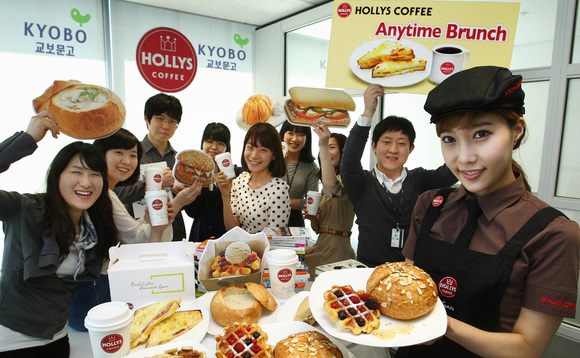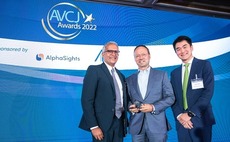
Portfolio: IMM Private Equity and Korea's Hollys Coffee

IMM Private Equity thinks Hollys Coffee has what it takes to become a homegrown star in Korea’s fiercely competitive coffee house industry. Two years into the investment, rejuvenation efforts appear to be paying off
In the Korean TV drama "The First Shop of Coffee Prince," released in 2007, a woman dresses as a man to work at a male-only coffee shop. The show was such a hit that the fictional shop featured in it has since become a popular chain; the first location opened at the storefront where the show's exterior scenes were filmed.
Coffee Prince's popularity was an early sign of the recent explosion of Western-style coffee shops in South Korean culture. Foreign listeners might have been befuddled when rapper PSY's "Gangnam Style" praised "A classy girl who knows how to enjoy the freedom of a cup of coffee," but to Korean audiences coffee houses have social cachet. The ubiquity of such establishments in Korea is all the more remarkable, considering they were virtually unknown just two decades ago.
For Joseph Lee, partner and senior managing director at IMM Private Equity, the prominence of coffee in Korean pop culture has been a reliable icebreaker negotiating the international expansion of portfolio company Hollys Coffee.
"We were talking to a potential Chinese partner," Lee recalls. "He comes into the office - and at our office, all of the coffee mugs have the Hollys logo - and he looks at the logo and starts laughing." Upon seeing the team's confusion, the man explained that he had seen the same logo the previous night in a Korean drama that he watched before his flight from Beijing.
Left behind
Founded in 1998, Hollys is the oldest of South Korea's homegrown coffee chains. Amidst the exponential growth in the industry following the arrival of Starbucks in 1999, the company has maintained profitability but fallen behind its rivals in terms of new store openings. Starbucks had 642 locations as of June 2014, while homegrown brand Caffe Bene had 945 as of April 2014. Hollys' total stood at 439 at the end of 2013.
When it paid $87.5 million for a 60% stake in the company in 2013, IMM was looking to leverage its experience in the food and beverage sector. In 2009 the PE firm had invested in SRS, the Korean franchisor of Burger King and KFC, through a joint venture with Mirae Asset MAPS Global Investments. The two firms paid $42.9 million for a 49% stake in the company.
"SRS was interesting in that Burger King and KFC had different competitive dynamics. Burger King was competing with McDonald's and Lotteria, a Korean conglomerate brand, whereas KFC was competing with dozens of local lower priced fried chicken brands," Lee says. "We had to tailor our business plan to mirror the dynamics of not just the overall food and beverage industry, but sub-segments within the industry that had totally different forces at play."
IMM exited its SRS in 2013 through a trade sale, earning a multiple of more than 2x. After the sale, the rapidly growing coffee shop sector seemed like a safe bet. It was a business where seemingly anyone could make money, almost without putting in any effort.
"If you're a passive owner it could be a good business, because if you're a franchise model, you're not putting a lot of equity capital at risk, and it's a positive cash flow fund model if you have a solid brand and locations," Lee says.
However, the firm had bigger plans for its acquisition than to sit back and watch the money flow in. IMM believed Hollys had a chance to become a market leader.
The rush to open new coffee shops in Korea was in part predicated on the fact that the industry was still growing. Per capita coffee consumption stood at 2.6 kilograms, ranking it 26th in the world overall - behind the USA (3.1 kg), Italy (3.4 kg) and Estonia (4.2 kg). Moreover, in an increasingly crowded market, Hollys' experience gave it an edge. As the first espresso chain in Korea, it had the oldest independent roasting plant and the first coffee academy in the country. It imported its own beans and crafted its own blends, which other independent coffee chains in Korea could not do.
An obvious problem remained in the lack of stores. At the time of IMM's investment, Hollys had 400 locations; Starbucks had opened its 500th shop a year earlier. More worrisome for management was the fact that Hollys only opened 43 stores in 2013, while Starbucks has averaged 80 openings a year since 2011. The firm has since boosted those numbers, expanding to 477 stores as of April 2015; it plans to add over a hundred more by the end of the year.
The control imperative
As important as new stores, however, was the need to deliver a consistent experience across the larger number of locations. This was difficult under the existing business model, as Hollys, like many other Korean coffee chains, mostly expanded through franchising. The approach does offer benefits for a cash-strapped owner, in that the franchise operators put up their own money and assume the capital risk. But it leaves the brand owner with less control.
"If the franchised stores are not managed well or controlled with one voice, so the customer experience can vary between stores," says Jieun Lee, head of marketing for Hollys. "In the long term it's really important to have more of the company-owned stores in order to manage the unified customer experience."
Managing locations directly also means the parent company does not have to share profits with franchisors.
Progress has been slower in this area. While less than 10% of the stores opened in 2013 were company-owned, that number has increased to nearly 20% of the total today. By comparison, every Starbucks location in Korea is company-owned. This direct control also allows Starbucks to skirt rules that forbid franchised stores from opening new locations within 500 meters of other coffee shops.
Hollys has pursued both organic and inorganic expansion, taking over rival brands that target segments it hopes to pursue. One such acquisition was De Chocolate; Hollys is positioning this brand to target take-out customers, so that the core brand's image as a hangout spot is not threatened. IMM helped Hollys source this deal through its network.
"Though Hollys may have had an idea about entering into the take-out market, it was difficult to implement," says Eugene Kim, a vice president at IMM who was seconded to Hollys following the takeover. "Using our network it was much easier to realize this idea."
IMM also hopes to improve the appeal of Hollys among young people, one of the fastest-growing customer groups for the coffee industry. Kim recalls that one of their first steps was to design a new decor for the shops, to make them brighter and more open.
There was also an effort to revitalize the company's food offering. In Korea, where customers tend to stay for long periods in coffee houses rather than ordering drinks to take away, the dining menu is an important factor in attracting visitors.
"The past offerings hadn't really met the consumer needs in full, so we renovated the whole category, and tried to add more menu items, such as the recently launched Dutch baby pancakes," Kim adds. She credits the menu changes for a 5% growth in per-customer spending, along with an increase in overall customer numbers.
Another initiative, designed to boost customer loyalty has seen Hollys revamp its membership program. The company added a social aspect to its smart phone app, allowing members to send coupons to friends, and improved engagement via its Facebook page.
Bigger undertakings include the first Hollys Coffee Festival in 2014, attended by 10,000 people. The festival featured performances by Korean pop stars, along with booths where Hollys baristas demonstrated brewing techniques and foam art. Kim feels these engagement efforts have paid off, with a Korea Consumer Agency survey earlier this year finding the chain tied second with Starbucks in overall customer satisfaction. (First place went to local discount coffee chain Ediya.)
While Hollys has taken pains to emphasize its homegrown nature in Korea, the company has gone the opposite route in overseas markets, portraying itself as an outpost of Korean culture. Fortunately for the company, the two approaches can be served by the same strategy.
"When we go into countries like China, we don't position ourselves as a head-on competitor to Starbucks. We position ourselves as a true-blue Korean brand. And to do that, we appeal to the affiliation with Korean content, meaning we try to find ways to enhance tie-ups with Korean dramas, movies and pop songs," IMM's Lee says.
Product placement in Korean dramas also plays a major role, with awareness of the brand's logo spreading even to those who have never visited a shop in person.
Taking Korea overseas
Expanding to other countries requires a different structural approach to the one taken at home. Rather than trying to manage stores directly in an unfamiliar real estate and staffing market, Hollys has partnered with local franchisors for its 20 stores in mainland China, and others in Thailand, the Philippines and Malaysia. The company has tapped into IMM's network for partners, in particular a sovereign wealth fund investor that has connected Hollys with franchise partners.
Another area in which IMM has helped Hollys is the acquisition of new talent. The country's chaebols tend to attract the best graduates due to their prestige and resources, and they are as eager to get involved in the coffee business as anyone else. Consequently independent brands like Hollys have to contend with the likes of the Lotte Group's Angel-in-us and the CJ Group's A Twosome Place for the best managers.
"In Korea this talent gap is very significant," says IMM's Lee. The private equity firm's involvement with Hollys has helped raise the company's profile to potential employees through the resources and networks that it commands. Lee says the ability of his firm to help non-chaebol companies like Hollys find talented people "is a clear example of how private equity can positively impact the small medium cap segment in Korea."
IMM is only two years into its investment, and at the moment is still focused on efforts to propel the company into the top three brands in Korea. Though the PE firm invested during a time of slumping revenue, with growth dropping from 50% in 2011 to 14.2% in 2012 and 4.3% in 2013, in 2014 there was a rebound, as revenue increased 17.1%. This outpaced the 10% growth rate of the coffee shop market overall. Hollys' profit has also risen compared to similar companies, which management sees as a vindication of its efforts.
"Hollys' EBITDA growth is the highest among its peer companies - 13% last year compared to about 11% for its peers," says Mingyu Lee, Hollys' head of strategy. He adds that peer companies from a financial reporting standpoint do not include brands like Starbucks and Coffee Bean, whose locations are mostly company-owned.
IMM has targeted a five-year lifespan for its investment, to allow enough time for the new hires it facilitated and the new initiatives to take hold. The firm is confident about the company's performance, as its improvement so far has outpaced its internal projections. Lee says he believes Hollys could generate an exit multiple of more than 3x.
Though it is early to be actively considering exit options, IMM is contemplating a trade sale, similar to its exit from SRS. The thinking is that as Hollys moves up in the industry its value to strategic investors will continue to improve.
"Once we fully implement our business plan, Hollys will be a unique company," Lee says. "When you have hundreds of points of sale in Korea, China and Southeast Asia, it can be a very interesting platform for both strategic and financial investors to own and develop further."
Latest News
Asian GPs slow implementation of ESG policies - survey
Asia-based private equity firms are assigning more dedicated resources to environment, social, and governance (ESG) programmes, but policy changes have slowed in the past 12 months, in part due to concerns raised internally and by LPs, according to a...
Singapore fintech start-up LXA gets $10m seed round
New Enterprise Associates (NEA) has led a USD 10m seed round for Singapore’s LXA, a financial technology start-up launched by a former Asia senior executive at The Blackstone Group.
India's InCred announces $60m round, claims unicorn status
Indian non-bank lender InCred Financial Services said it has received INR 5bn (USD 60m) at a valuation of at least USD 1bn from unnamed investors including “a global private equity fund.”
Insight leads $50m round for Australia's Roller
Insight Partners has led a USD 50m round for Australia’s Roller, a venue management software provider specializing in family fun parks.








